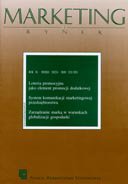The impact of the COVID-19 pandemic on the scope and quality of courier services. Results of a preliminary study
The dynamically growing courier services industry in Poland with the spread of the COVID-19 pandemic, like all courier companies worldwide, has had to adapt to the prevailing conditions. At the same time, due to the numerous epidemic restrictions associated with land-based commerce, the KEP industry has had to contend with handling the increasing number of orders associated with online shopping. The aim of this paper is to assess the impact of the COVID-19 pandemic on the range and quality of services provided by courier companies. The preliminary study was conducted among 380 respondents (Polish residents) using the CAWI survey technique. The survey questionnaire contained questions to collect information on the use of courier services both during and before the pandemic. From the results obtained, it can be concluded that the COVID-19 pandemic had little impact on changing the scope of provision and perception of the quality of courier services. It mainly contributed to an increase in the frequency of online shopping and thus the use of courier services and a shift towards contactless forms of delivery and payment. It should also be mentioned that respondents noted an increase in the level of service quality (compared to pre-pandemic times) primarily in the case of service safety, delivery time and the availability of tracking options.
References
Bibliografia/References
Aljohani, K. i Thompson, R. G. (2020). An Examination of Last Mile Delivery Practices of Freight Carriers Servicing Business Receivers in Inner-City Areas. Sustainability, 12(7), 2837. https://doi.org/10.3390/su12072837
Choi, D., Chung, C. Y. i Young, J. (2019). Sustainable Online Shopping Logistics for Customer Satisfaction and Repeat Purchasing Behavior: Evidence from China. Sustainability, 11, 5626. https://doi.org/10.3390/su11205626
Ejdys, J. i Gulc, A. (2020). Trust in Courier Services and Its Antecedents as a Determinant of Perceived Service Quality and Future Intention to Use Courier Service. Sustainability, 12, 9088. https://doi.org/10.3390/su12219088
Fajczak-Kowalska, A. i Kowalska, M. (2017). Jakość usług logistycznych — rozwiązania wykorzystane w ostatniej mili przez firmy kurierskie. Logistyka, (2), 42–45.
Frąś, J. (2014). Wybrane instrumenty pomiaru jakości usług logistycznych. Zeszyty Naukowe Uniwersytetu Szczecińskiego. Finanse, Rynki Finansowe, Ubezpieczenia, 66, 297–317.
Gulc, A. (2017a). Charakterystyka usług kurierskich w Polsce. Humanities and Social Sciences, XXII(24), 61–75.
Gulc, A. (2017b). Courier service quality from the clients' perspective. Engineering Management in Production and Services, 9(1), 36–45. https://doi.org/10.1515/jem-2017-0004
Gulc, A. (2020). Relacyjny model systemu kształtowania jakości usług kurierskich w branży e-commerce. Białystok: Oficyna Wydawnicza Politechniki Białostockiej.
Harrison, A. i Hoek, R. (2010). Zarządzanie logistyką. Warszawa: PWE.
Ho, J. S. Y., Teik, D. O. L., Tiffany, F., Kok, L. F. i The, T. L. (2012). Logistic service quality among courier services in Malaysia. International Conference on Economics, Business Innovation, 38, 113–117.
Jarocka, M. (2018). The issue of logistics services in the international scientific literature. Proceedings of the 8th Carpathian Logistics Congress on Logistics, Distribution, Transport and Management (CLC), 508–513.
Kawa, A. (2015). Branża pośredników KEP — istota, rodzaje podmiotów i znaczenie. Logistyka, (1), 55–57.
Kawa, A. (2017). Analiza rynku KEP w Polsce. Poznań: GS1.
Kucia, K. (2020). Determinanty motywujące do zakupów na rynku e-commerce w Polsce w latach 2017–2018. Zeszyty Naukowe Politechniki Częstochowskiej. Zarządzanie, 37, 25–34.
Leończuk, D., Ryciuk, U., Szymczak, M. i Nazarko, J. (2019). Measuring performance of adaptive supply chains. W: A. Kawa i A. Maryniak (red.), SMART Supply Network (s. 89–110). Cham: Springer International Publishing.
Liu, L. i Liu, Ch. (2014). Empirical Study of Express Logis-tics Service Quality -A Survey of Changdao County Express Sector. 2nd International Conference on Education Technology and Information System (ICETIS 2014). Atlantis Press, 542–546.
Łukasik, Z., Kuśmińska-Fijałkowska, A., Kozyra, J. i Kołodziejczyk, P. (2017). Usługi logistyczne w przedsiębiorstwach kurierskich krajowych i międzynarodowych. Autobusy: Technika, Eksploatacja, Systemy transportowe, 18(9), 158–164.
Micu, A., Aivaz, K. i Capatina, A. (2013). A. Implications of logistic service quality on the satisfaction level and retentionrate of an e-commerce retailer's customers. Economic Computation and Economic Cybernetics Studies and Research, 47, 147–155.
Mordor Intelligence (2021a). Courier, express, and parcel (CEP) market — growth, trends, Covid-19 impact, and forecasts (2021–2026).
https://www.mordorintelligence.com/industry-reports/courier-express-and-parcel-cep-market (17.05.2021).
Mordor Intelligence (2021b). Poland courier, express, and parcel (CEP) market — growth, trends, COVID-19 impact, and forecasts (2021–2026). https://www.mordorintelligence.com/industry-reports/poland-courier-express-and-parcel-market (17.05.2021).
Park, H., Park, D. i Jeong, I. J. (2016). An effects analysis of logistics collaboration in last-mile networks for CEP delivery services. Transport Policy, 50, 115–125. https://doi.org/10.1016/j.tranpol.2016.05.009
Romanow, P. (2008). Strategie transportowe operatorów z branży TSL w łańcuchach dostaw. Logistyka, (2), 34–27.
Rutkowski, K., Cichosz, M., Nowicka, K. i Pluta-Zaremba, A. (2011). Branża przesyłek kurierskich, ekspresowych i paczkowych. Wpływ na polską gospodarkę. Warszawa: Centrum Doradztwa i Ekspertyz Gospodarczych SGH.
Seghezzi, A., Mangiaracina, R., Tumino, A. i Perego, A. (2020). 'Pony express' crowdsourcing logistics for last-mile delivery in B2C e-commerce: an economic analysis. International Journal of Logistics-Research and Applications (wczesny dostęp). https://doi.org/10.1080/13675567.2020.1766428
Stoma, M. (2012). Modele i metody pomiaru jakości usług. Lublin: Q&R Polska Sp. z o.o.
Szymczak, M., Ryciuk, U., Leończuk, D., Piotrowicz, W., Witkowski, K., Nazarko, J. i Jakuszewicz, J. (2018). Key factors for information integration in the supply chain — measurement, technology and information characteristics. Journal of Business Economics and Management, 19(5), 759–776.
UKE (2020). Raport o stanie rynku pocztowego w 2019 roku. Warszawa: Urząd Komunikacji Elektronicznej.
Wiącek, M. i Ligeikienés, R. A. (2020). Stakeholders versus technological changes — theory and practice. Marketing i Rynek, (12), 3–13. https://doi.org/10.33226/1231-7853.2020.12.1
Yee, H. L. i Daud, D. (2011). Measuring Customer Satisfaction in the Parcel Service Delivery: A Pilot Study in Malaysia. Business and Economic Research, 1(1), 1–10. https://doi.org/10.5296/ber.v1i1.1125
Yu, B., Zhang, S., Wu, S. i Xie, J. (2013). A study of courier service quality improvement based on a two-stage QFD. LISS 2012 — Proceedings of 2nd International Conference on Logistics, Informatics and Service Science, 885–891. https://doi.org/10.1007/978-3-642-32054-5_123
Zakorova, E. (2017). E-commerce and its Impact on Logistics Requirements. Open Engineering, 7(1), 121–125. https://doi. org/10.1515/eng-2017-0018
Zimon, D. (2013). Zarządzanie jakością w logistyce. Warszawa: CeDeWu.

